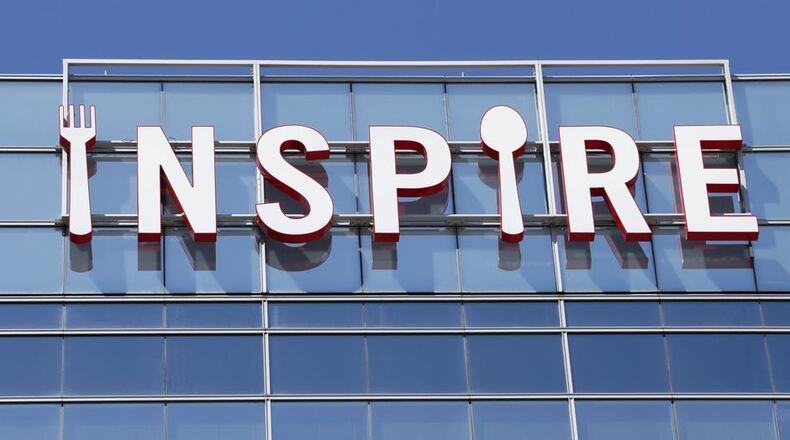A little less than three years ago, the CEO of Sandy Springs-based Arby’s laid out a dreamy plan: Grow beyond the We-Have-The-Meats fast-food brand to gobble up other restaurant chains, a move that he said would bring more corporate jobs to metro Atlanta.
Since then, under the company name Inspire Brands, Paul Brown has acquired makers of food that Georgia stomachs know well, from Sonic to Buffalo Wild Wings and Jimmy John’s. But his latest target — Dunkin' Brands, the parent of Dunkin' Donuts and Baskin-Robbins — exceeds even the lofty goals he initially described.
Dunkin' Donuts alone is ranked as the nation’s eighth-largest quick service chain, based on more than $9 billion in U.S. revenue last year at its restaurants, all of which are operated by franchisees. Arby’s was 15th.
The donut chain’s system sales are twice as high as the upper range of what Brown initially had said he was seeking when he unveiled plans for Inspire Brands in early 2018.
“We are very patient,” Brown told The Atlanta Journal-Constitution back then.
But in the midst of a pandemic, getting Dunkin' would be Inspire’s fourth major takeover and its most widely known brand to date.
Dunkin', a public company, on Sunday confirmed media reports that it is in preliminary discussions to be acquired by privately held Inspire, though it said “there is no certainty that any agreement will be reached.” Inspire declined to comment.
Inspire’s growth has already paid off with jobs in metro Atlanta. It has jumped from 375 headquarters jobs when it was just Arby’s to about 1,000 today.
Inspire has consolidated some back office functions in Georgia. But it has kept the images and menus of the chains distinct. And it has retained “support centers” where the brands it acquired were based. Dunkin', which had about 1,100 employees as of the end of last year, is headquartered in the Boston area, where the donut chain has deep roots.
Inspire’s chains already have a total of more than 11,000 restaurants, many operated by franchisees, and $14.6 billion in sales.
Brown told the AJC in an earlier interview that Inspire’s moves would “continue to solidify Atlanta as the restaurant capital of the country.”
Chick-fil-A, Waffle House, Zaxby’s, Church’s Chicken and Krystal are all based in Georgia.
So are a host of brands that have ties to Inspire’s majority owner, Atlanta-based private equity firm Roark Capital. Among Roark’s $19 billion in assets under management are investments in Focus Brands (Moe’s Southwest Grill, Carvel Ice Cream, Cinnabon, Auntie Anne’s Pretzels, McAlister’s Deli, Schlotzsky’s and Jamba), CKE Restaurants (Carl’s Jr and Hardee’s), Miller’s Ale House, Culver’s, The Cheesecake Factory, Corner Bakery, Jim 'N Nick’s BBQ and Naf Naf Middle Eastern Grill.
Roark was founded in 2001 by Neal Aronson, who named his company after the fiercely independent protagonist in Ayn Rand’s book The Fountainhead. The book has been embraced by some conservative political leaders and libertarians. Roark, the company, states on its website that “as a firm of diverse viewpoints," the name "does not signify adherence to any particular political philosophy.”
Brown, meanwhile, is a former leader at Hilton Worldwide who switched to the restaurant business. He won kudos for an image makeover at Arby’s, including its meat-loving ads and quick-witted social media moves. Inspire likes to highlight interest in “maverick” qualities for both its employees and brands, “each with their own distinct positioning, guest experience and product offering,” according to a company website.
John Gordon of Pacific Management Consulting Group, a restaurant consulting firm, said he has worked with Dunkin’s franchisees and that the Inspire CEO is well thought of in the industry. Roark, Gordon added, is viewed as a long-term investor intent on building up brands rather than loading them up with debt and aiming at a quick sale.
The pandemic has scrambled much of the nation’s restaurant business. But fast-food chains with drive-through options are seen as having a strategic advantage for the times.
Dunkin' saw sharp declines in the first several months of the pandemic, but in its last quarterly release it said improvements were underway. Its donut shop business was already in the midst of shifting its focus to sell more hot and cold drinks, Gordon said.
The donut chain has more than 13,000 locations, though it said it expects to shed a number of units. Baskin-Robbins has another 8,000 locations.
About the Author
Keep Reading
The Latest
Featured



